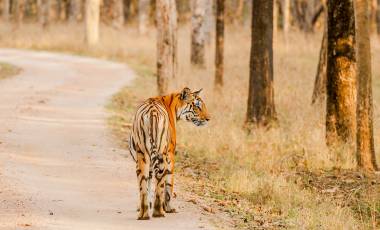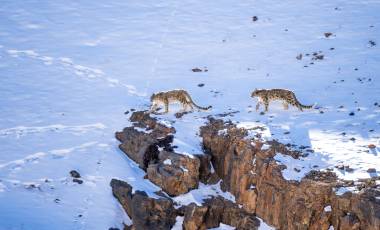This was a busy itinerary with some early starts and long transfers, but it meant we saw so many amazing places every day. Our memory of the first week in the north, was of the noisy mayhem that is India, with quite a lot of sightseeing to monuments. In contrast the week in Kerala was more relaxed either by the sea or in the mountains. Being a ‘Premium Adventure’ meant we were in good standard hotels, and about half the dinners and some lunches were included in the price, which was appreciated. Also, our leader saw to all the tipping for the whole trip, so we didn’t have to have a kitty (a bit of a bugbear on previous Exodus trips).

Tiger Safari & Wildlife Holidays in India
Tiger Safari in India
Top 5 Places for a Tiger Safari in India
Ladakh: Our safari with Valerie Parkinson takes you on an incredible adventure through the peaks of Ladakh as you go in search of the snow leopard. The rugged terrain and pristine landscapes of Ladakh provide the perfect backdrop for this once-in-a-lifetime experience. As you embark on this trek, you’re enveloped by the raw beauty of the Himalaya, enhancing the sense of adventure and excitement. Spotting a snow leopard and other wildlife prowling through the wilderness is a breathtaking moment that will stay with you forever.
Bandhavgarh National Park: Nestled in the heart of India, Bandhavgarh National Park is renowned for its high density of tigers, making it a prime destination for tiger sightings in their natural habitat. Head off on exciting tiger safaris through the dense forests, where you may encounter these majestic creatures up close as well as a diverse range of flora and fauna. With our expert guides leading the way, you’ll explore every corner of Bandhavgarh National Park and enjoy prime wildlife viewing.
Pench National Park: A tiger safari in Pench National Park takes you on a thrilling and immersive adventure in the heart of nature. As you trek through the lush forests and sprawling grasslands, look out for the majestic Bengal tigers in their natural habitat. The wild beauty of the park, coupled with the chance to witness these magnificent creatures up close, makes for an unforgettable experience. Led by our knowledgeable guides, you’ll learn about the importance of tiger conservation and the delicate ecosystem of the park where these endangered species are protected in the wild.
Kanha National Park: Kanha National Park is a renowned sanctuary for tigers and diverse wildlife species. Tigers, the majestic predators, play a crucial role in maintaining ecological balance in the park. Their presence indicates a healthy ecosystem and biodiversity. Apart from tigers, Kanha is also home to a wide variety of wildlife such as leopards, deer, sloth bears and numerous bird species. The park’s dense forests and grasslands provide a natural habitat for these animals to thrive. Conservation efforts in Kanha aim to protect these endangered species and preserve their natural habitats.
Ranthambore National Park: Nestled in India’s northern state of Rajasthan, Ranthambore National Park plays host to tigers and a huge array of wildlife. Spread over 390 square kilometres, it boasts a sprawling landscape of deep forests, ancient ruins and tranquil lakes. The park’s population of tigers, along with leopards, sloth bears and colourful species of birds, make it a haven for nature lovers and wildlife photographers. Beyond its natural beauty, Ranthambore also holds historical significance with the imposing Ranthambore Fort standing proudly within its boundaries. As a symbol of wilderness and conservation, the park stands as a testament to the harmonious coexistence of nature and wildlife.
Joan Brightwell India's North & South – Premium Adventure
Philip Murray Cycling Through RajasthanTrip completed in Jan-Feb 2025. This was my first time in India. The cycling was excellent (one day with 900m elevation riding to Kumbhalgarh but otherwise actually easier in terms of elevation/distance than on other grade 3 trips I’ve been on). Cycling in the cities is somewhat of an adrenaline sport which was great fun! The Taj Majal, Udaipur and Jodhpur Fort were all excellent. The food is exceptionally good. The bus was the most comfortable exodus trip bus I’ve ever been on and made the longer journeys a pleasure. I enjoyed the experience of the overnight train journey.
The Shree Ram hotel, Kumbhalgarh Forest Retreat and Sariska Safari Lodge I found to be very good and enjoyed staying there. The room in Ashok Country Resort was somewhat damp/musty. With the swimming pool closed there isn’t much to do there and, other than the airport, there’s nothing nearby. Food there was good. Bathrooms in the vesta mayura palace and udai villas were dirty. A night club next to the vesta mayua pumps out window shaking music until around midnight. This holiday is really cheap for two weeks – I know I can’t expect too much of a three star hotel in India but I’d rather have paid a bit more and had a nicer cleaner hotel at every stop.
Where are the best places to go on a tiger safari in India?
India boasts several national parks and wildlife reserves known for their thriving tiger populations. Some of the top destinations for tiger safaris include Ranthambore National Park in Rajasthan, Bandhavgarh National Park in Madhya Pradesh and Kanha National Park in Madhya Pradesh. Each of these reserves provides a unique experience and great chances of spotting tigers in their natural habitat. Ranthambore is a particularly spectacular park, not just for tiger sightings but for its ancient fort and beautiful landscapes that create a stunning backdrop for game drives.
What is the best time of year to go on a tiger safari in India?
The best time for India tiger safaris is typically during the dry season, which spans from October to March. During this period, the vegetation is sparse, making it easier to spot the tigers in their natural habitat. The cooler temperatures also increase tiger activity, making them more likely to roam in search of prey. Also, the months of February and March are ideal as the water sources start to dry up, leading tigers to congregate around remaining waterholes, providing excellent viewing opportunities.
FAQs on Tiger Safari in India
To increase your chances of spotting a tiger on safari, several strategies can be used. Choose a safari location known for tiger sightings, such as Ranthambore National Park or Bandhavgarh National Park. Opt for early morning or late afternoon safaris when tigers are most active. Listen to your guide’s advice and be patient, as tiger sightings can be unpredictable. Wear appropriate clothing in earthy tones to blend in with the surroundings, keep noise to a minimum and stay alert for signs of tiger presence, such as alarm calls from other animals. By following these tips, you can enhance your chances of encountering these fabulous creatures in the wild.
While wildlife safaris are generally safe when conducted by experienced and responsible guides, there are inherent risks involved. Tigers are wild animals, and their behaviour can be unpredictable. However, all our safaris adhere to strict safety protocols to ensure the well-being of both visitors and animals. You are advised to follow guidelines, maintain a safe distance from the tigers, and respect their environment. With proper precautions, expert guides and awareness, going on a tiger safari in India is a safe experience.
As well as spotting tigers on a safari in India, there is a diverse array of wildlife that you might encounter. India’s national parks and reserves are home to a variety of animals such as leopards, elephants, sloth bears, Indian bison and several species of deer including sambar and spotted deer. Bird lovers will be in their element spotting colourful avian species like peafowl, kingfishers and birds of prey. The lush jungles of India also house other creatures like monkeys, wild boars and reptiles.
When planning a tiger safari in India, you’ll need to allocate an adequate amount of time to really immerse yourself in the experience. To fully appreciate the beauty and majesty of these magnificent creatures, a minimum of 14 days is recommended. This duration allows for multiple safaris across different areas within popular national parks like Ranthambore, Bandhavgarh, Kanha and Pench, increasing your chances of spotting these elusive cats in their natural habitat. Spending a few days in the wilderness allows you to observe various behaviours and interactions of tigers, which will enhance your wildlife experience.
When packing for a safari in India, you’ll want light and practical clothing suitable for the prevailing weather conditions. Don’t forget to bring layers for cooler mornings and evenings. Sturdy walking shoes are crucial for exploring the terrain, along with a sun hat and sunglasses for protection. Other essentials include breathable and neutral-coloured clothing, insect repellent, sunscreen, a reusable water bottle, a camera with extra batteries and a pair of binoculars for spotting wildlife.
The Adventure Begins Here
Get regular inspiration straight to your inbox from Exodus’ experts.

